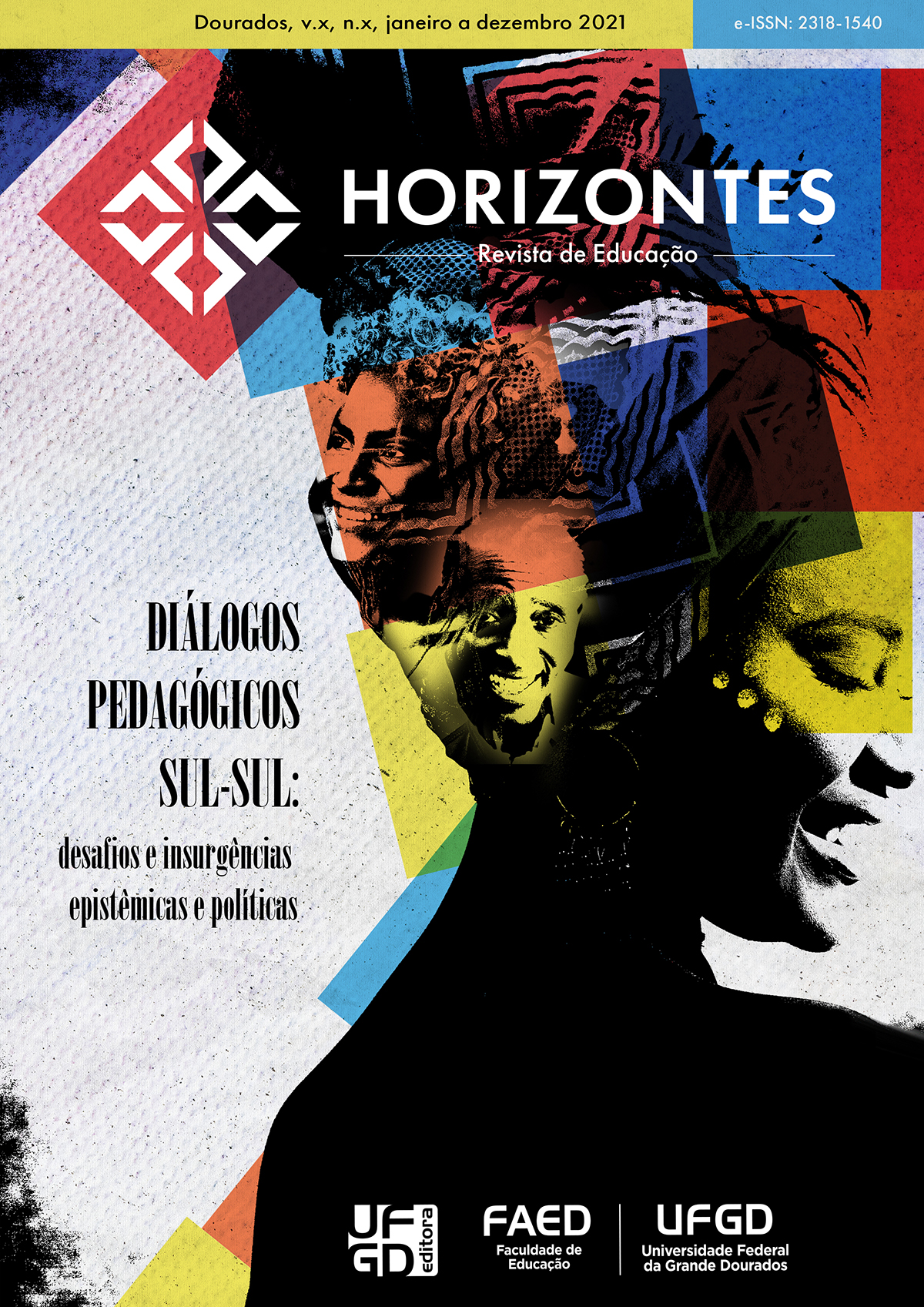ADMISSION OF QUILOMBOLAS AND INDIGENOUS PEOPLE IN UNILAB:
A PROPOSAL THAT IS BORN IN THE QUILOMBO SÍTIO VEIGA – QUIXADA/CE
DOI:
https://doi.org/10.30612/hre.v11i18.16601Keywords:
UNILAB, Affirmative Action, Quilombolas, Indigenous People, Quilombo Sítio VeigaAbstract
This article aims to talk about the entry of Quilombolas and Indigenous Peoples into the
University of International Integration of Afro-Brazilian Lusophony - Unilab. A proposal to expand
affirmative policies that was born in the Quilombola Community Sítio Veiga, Quixadá / Ceará, at the
17th State Meeting of Quilombola Communities of Ceará, in October 2017. with foundational precepts
of affirmative action, therefore, it is imperative to know how the improvement of these policies
has taken place. The text presents the state of the art about the context in which these measures
were created, from the favorable and democratic environment of the Governments of President Luiz
Inácio Lula da Silva to President Dilma Rousseff in supporting the implementation of quotas in public
universities (state and federal), in the case of Unilab, its existence can be considered the culmination
of a positive agenda for the realization of a strategic political-educational project to strengthen South-
South cooperation, in the production of knowledge about and between these countries. Finally,
we will discuss the context that approved Unilab’s Affirmative Action Program, which in addition to the candidates belonging to the Community of Portuguese-Speaking Countries - CPLP, among which
Brazil, Portuguese-speaking African countries (Angola, Cape Verde, Guinea-Bissau, São Tomé
and Príncipe, Mozambique) of Southeast Asia (East Timor), will welcome from September this year
(2021), 08 (eight) new social groups, among them, Quilombolas, Indigenous , LGBTQIA+ Community,
Gypsies, People with Disabilities, Young Egresses from Compliance with Socio-educational
Measures - MPSE, Refugees and Other Traditional Peoples.
Downloads
References
CÉSAIRE, Aimé. Discurso sobre o colonialismo. Lisboa: Sá da Costa, 1978.
COLLINS, Patrícia Hill. Pensamento Feminista Negro: conhecimento, consciência e a política do empoderamento: Tradução Jamile Pinheiro Dias. – 1. Ed. – São Paulo: Boi tempo, 2019.
COSTA, Jacqueline da Silva, Melo, Vico Dênis Sousa. Neoliberalismo e a colonialidade do saber: a UNILAB e o desmonte da educação. In: Le Monde Diplomatique. Brasil, ano 11, número 127, ano 2018.
FERREIRA. Antonio Jeovane da Silva (et all). Quilombo/las no Ensino Superior: faces do racismo e da discriminação étnico-racial no cotidiano universitário na Unilab. In: Educación Superior y Pueblos Indígenas y Afrodescendientes en América Latina Las múltiples formas del racismo. 2019.
GONÇALVES, L. A. O; SILVA, Petronilha B. G. e. Movimento Negro e educação. Set/Out/Nov/Dez 2000 Nº 15, p. 134 – 158.
HOOKS, Bell. Intelectuais negras. Trad. Marcos Santarrita. Revista Estudos Feministas, Florianópolis, vol.3, n. 2, p. 463-478, 1995.
HOOKS, Bell. Erguer a voz: pensar como feminista negra, pensar como uma negra. Elefante Editora. 2020.
LEWANDOWISK, Ricardo. Voto pela constitucionalidade das cotas. Brasília, 2012, 16 p.
QUINTILIANO, Marta. Redes Afro-Indígenoafetivas: uma Autoetnografia sobre Trajetórias, Relações e Tensões entre Cotistas da Pós-Graduação Stricto Sensu e Políticas de Ações Afirmativas na Universidade Federal De Goiás. 2019. Dissertação de Mestrado em Antropologia Social. Faculdade de Ciências Sociais, Universidade Federal de Goiás, Goiânia.
SILVA, Paulino Vinicius Baptista (et all). Black social movements and human rights.
SILVA, Paulo V. Baptista da; TRIGO, Silva Rosa Amália Espejo; MARÇAL, José Antônio. Revista Diálogo Educ., Curitiba, v. 13, n. 39, p. 559-581, maio/ago. 2013.
SILVÉRIO, Valter R. O papel das ações afirmativas: Em contextos racializados: algumas anotações sobre o debate brasileiro. SILVA, Petronilha Beatriz Gonçalves e; SILVÉ-RIO, Valter Roberto (Org). Educação e ações afirmativas: entre a injustiça simbólica e injustiça econômica. Brasília: INEP, 2003, p. 55-76.
SOUZA, J. (org.). Multiculturalismo e racismo: o papel da ação afirmativa nos Estados democráticos contemporâneos. Brasília: Ministério da Justiça, 1996, p.69-74.
SILVA, Antonio Gislailson Delfino da. Políticas Públicas E Ensino Superior: A Unilab como Política de Enfrentamento às Desigualdades Sociais e Raciais. Revista CESUMAR jul./dez. 2019, v. 24, n. 2, p. 301-325 DOI: 10.17765/1516-2664.2019v24n2p301-325
UNILAB. Programa de Ações Afirmativas da Unilab. Relatório Final do Grupo de Trabalho Ação Afirmativas da Unilab. Pró-Reitoria de Políticas Afirmativas e Estudantis. 2021.
Downloads
Published
How to Cite
Issue
Section
License

This work is licensed under a Creative Commons Attribution-NonCommercial-ShareAlike 3.0 Unported License.
Autores que publicam nesta revista concordam com os seguintes termos:
a. Autores mantêm os direitos autorais e concedem à revista o direito de primeira publicação, com o trabalho simultaneamente licenciado sob a Creative Commons Atribuição-NãoComercial-CompartilhaIgual 3.0 Brasil que permitindo o compartilhamento do trabalho com reconhecimento da autoria do trabalho e publicação inicial nesta revista.
b. Autores têm autorização para assumir contratos adicionais separadamente, para distribuição não-exclusiva da versão do trabalho publicada nesta revista (ex.: publicar em repositório institucional ou como capítulo de livro), com reconhecimento de autoria e publicação inicial nesta revista.
c. Autores têm permissão e são estimulados a publicar e distribuir seu trabalho online (ex.: em repositórios institucionais ou na sua página pessoal) a qualquer ponto antes ou durante o processo editorial, já que isso pode gerar alterações produtivas, bem como aumentar o impacto e a citação do trabalho publicado (Veja O Efeito do Acesso Livre).






